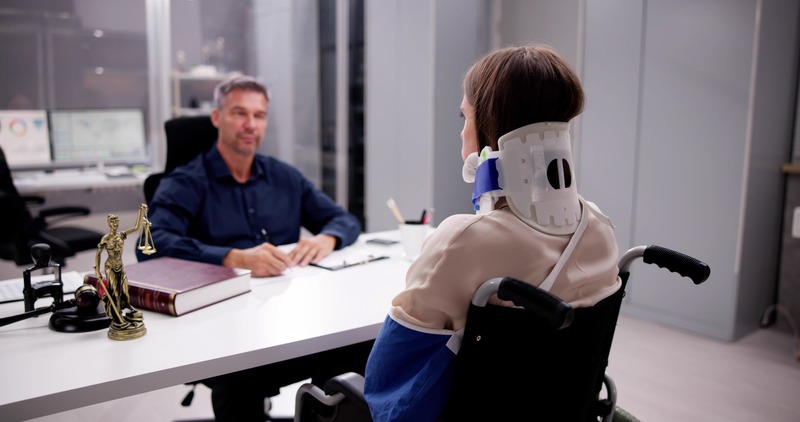
Who Can Sue for Personal Injury Claims?
Personal injury claims arise when individuals suffer harm due to the negligence or intentional actions of others. Those eligible to sue under this legal framework typically include the injured party, the plaintiff. However, the parameters of legal standing can extend beyond the direct victim, incorporating family members, legal representatives, and, in some cases, guardians of minors or incapacitated adults. The following individuals or entities commonly have the right to sue for personal injury claims:
1. Individuals Injured in Accidents
Personal injury claims often arise from motor vehicle accidents, slip and fall incidents, workplace accidents, medical malpractice, and defective product incidents. In these cases, individuals who have suffered injuries due to another party’s negligence, recklessness, or intentional misconduct may have the right to seek compensation through a personal injury claim with the help of reputable firms like Rubenstein Law. Examples of negligence in such cases may include a driver failing to obey traffic laws, a property owner failing to maintain safe premises, or a healthcare provider providing substandard medical care.
2. Family Members of Deceased Victims
When an individual dies as a result of another party’s negligence or wrongful conduct, certain family members may have the right to file a wrongful death claim on behalf of the deceased. Eligible family members typically include spouses, children, parents, or other dependents who have suffered losses as a result of the victim’s death. Wrongful death claims seek to compensate family members for damages such as funeral expenses, loss of financial support, loss of companionship, and emotional distress caused by the death of their loved one.
3. Legal Guardians or Representatives
In cases where the injured party is a minor or incapacitated adult, their legal guardian, parent, or representative may have the right to file a personal injury claim on their behalf. This ensures that individuals who cannot advocate for themselves due to age, incapacity, or disability can still seek compensation for damages resulting from their injuries. Legal guardians or representatives may pursue claims for medical expenses, pain and suffering, lost income, and other damages suffered by the injured individual.
4. Insurance Companies
Insurance companies may have the right to sue on behalf of their policyholders to recover damages resulting from accidents or injuries covered under an insurance policy. This often occurs in cases where the insurance company has already compensated the policyholder for losses incurred due to the actions of another party. For example, suppose an insured driver is injured in a car accident caused by another driver’s negligence. In that case, the insurance company may file a subrogation claim against the at-fault driver to recover the compensation paid to their insured.
5. Government Entities
Government entities may also have the right to file personal injury claims in certain circumstances. For example, a government agency may sue a negligent contractor for damages caused by construction defects or environmental contamination on public property. Additionally, government entities may pursue claims for damages resulting from injuries caused by government employees or agencies, such as in cases of police misconduct, premises liability, or medical negligence at government-run facilities.
6. Employees Injured in Workplace Accidents
Injured employees can file workers’ compensation claims to seek benefits for medical expenses, lost wages, and disability resulting from workplace injuries. In cases where workplace injuries are caused by third parties (e.g., negligent contractors, defective equipment manufacturers), injured employees may have the right to pursue personal injury claims against those responsible parties. If the injury occurred in the Empire State, consulting with a personal injury attorney New York can guide how to proceed with a claim to ensure that the employees’ rights are fully protected and they receive the compensation they deserve.
7. Passengers Injured in Public Transportation Accidents
Passengers injured in public transportation accidents, such as buses, trains, taxis, or rideshare vehicles, may have the right to file personal injury claims against the transportation company, operator, or other liable parties. These claims seek compensation for injuries sustained during transportation, including medical expenses, lost income, and pain and suffering.
8. Pedestrians and Bicyclists Injured in Traffic Accidents
Pedestrians and bicyclists can pursue personal injury claims if injured in motor vehicle accidents. These claims typically seek compensation for injuries caused by a driver’s negligence, such as failing to yield, speeding, distracted driving, or driving under the influence of alcohol or drugs. Personal injury claims with the aid of a motorcycle accidents attorney help pedestrians and bicyclists recover damages for medical expenses, lost income, and other losses resulting from the accident.
9. Consumers Injured by Defective Products
Consumers injured by defective products, such as faulty vehicles, appliances, medical devices, or pharmaceutical drugs, may have the right to file product liability claims against the manufacturers, distributors, or sellers of the defective products. Product liability claims allege that the product was unreasonably dangerous or defective and that the defect caused the consumer’s injuries. These claims seek compensation for medical expenses, lost income, and other damages from using the defective product.
10. Residents Injured in Premises Liability Incidents
Individuals injured on another party’s property due to hazardous conditions, such as slip and fall accidents, dog bites, or inadequate security, may have the right to file premises liability claims against the property owner or occupier. Premises liability claims allege that the property owner failed to maintain safe conditions or warn of known hazards, leading to the plaintiff’s injuries. These claims seek compensation for injuries, medical expenses, and other losses resulting from the unsafe conditions on the premises.
Wrapping Up
Personal injury claims are vital for holding parties accountable for damages caused by their actions or omissions. While the direct victim primarily holds the standing to sue, the ambit extends to individuals closely associated with them, such as parents, spouses, or legal guardians. These provisions ensure comprehensive coverage for those impacted, securing a means to alleviate the financial and emotional toll of personal injuries.


